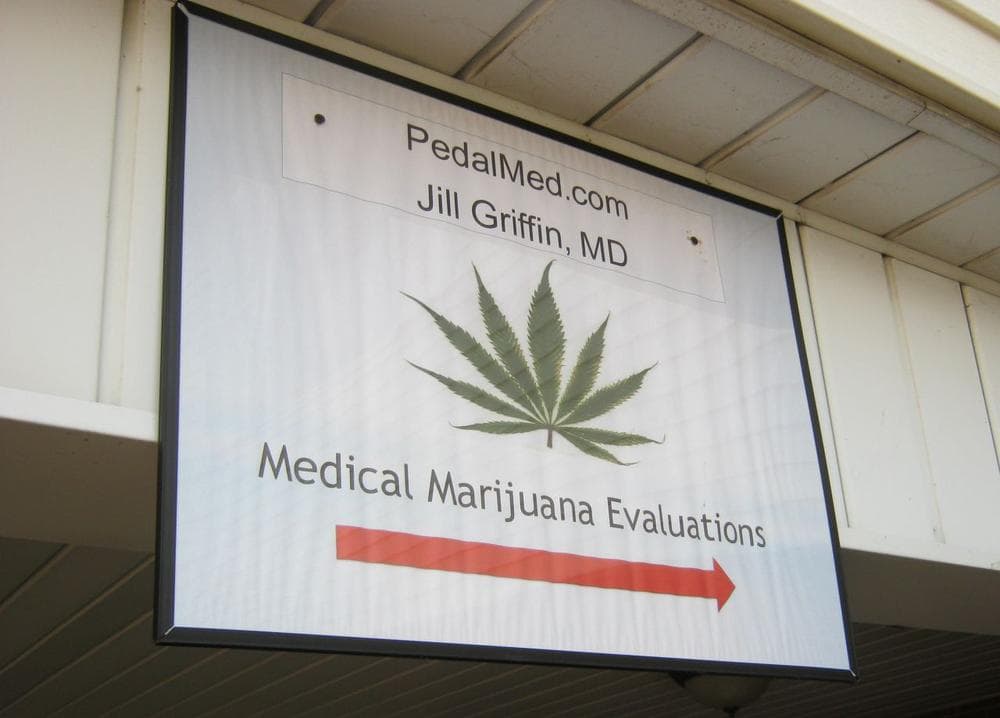Advertisement
Despite Lack Of Dispensaries, One Doctor Already Recommending Medical Marijuana
ResumeRegulations for medical marijuana in Massachusetts officially go into effect Friday.
While medical marijuana remains illegal under federal law, the drug has been legal under state law since January, after voters approved it in a ballot measure last November.
But even before formal regulations were in place, and without any registered dispensaries in the state, one doctor from Northampton had begun writing marijuana recommendations for her patients.

Dr. Jill Griffin says she was not immediately sold on marijuana's medicinal use, seeing it as an excuse for people to legally get high. After the law passed, she says patients started asking her about the drug. At first she disregarded those questions. But then she says she decided to take a chance by writing one recommendation for an elderly cancer patient.
"She was able to eat and get up and go out and go shopping," Griffin said. "And prior to that, she had really been housebound."
After that initial success, Griffin says she did more research, and decided to open her small office exclusively for medical marijuana. For $200, she meets with patients, examines their medical records, and decides if they're eligible. The law states that a patient must have a "debilitating medical condition," such as cancer, Parkinson's disease or HIV. But under new regulations that go into effect Friday, a doctor can determine "other" debilitating conditions that could respond to the drug. Griffin says that's where most of her patients fall.
"Most common is chronic pain, and amongst the chronic pain is low back pain," she said.
Part of the reason she's chosen to open her office, she says, is the hesitance of many primary care doctors to recommend marijuana to patients. And though Griffin says many of her patients are new to her, she maintains the required relationship with them through follow-up calls and visits.
Alan Berkenwald, a physician at Cooley Dickinson Hospital, says he was initially open to the idea of medical pot, but now he's skeptical due to the lack of scientific research.
"My fear is that our rush to embrace medical marijuana now, well in advance of thought-out studies, is an example of that phenomenon where we're embracing a cultural belief and trying to squeeze it into a medical application well before the data supports it," he said.
Berkenwald says he's particularly concerned about the open-ended ability of doctors to decide what conditions qualify. But Griffin says she is careful to sift out patients who may be trying to get a recommendation just to get high.
"There are certain qualities and characteristics of those diseases that a patient should be able to explain to you, and if that's not there, they can't qualify," Griffin said.
She says she's turned away several patients but approves over 90 percent who come to her office. And she has prescribed the drug to patients with conditions that some may find dubious. Tim, one of Griffin's patients who declined to give his last name, was given a prescription for attention deficit disorder and insomnia. He says he's now concerned about access to the drug he's been prescribed.
"You can't get it if you don't have the avenue to get it, and plus there's so many places that are not doing the right thing," he said. "So they may be adding certain chemicals or pesticides, which you definitely don't want."
Tim won't say how he currently gets marijuana. Up to 35 marijuana dispensaries can open in the state, but none will likely open until the end of the year. Griffin says she's worried about the current legal gray area for her patients.
"What I tell my patients is, you could go into a known area where people purchase marijuana, and you can legally buy the marijuana if you take your letter with you, and you can buy it, but the person selling it to you can be arrested," Griffin said.
Once a patient does get their hands on the drug they're allowed to have up to 10 ounces every 60 days. Berkenwald says that's far too much for one person, and could result in patients selling off their excess pot — a practice known as diversion.
"History has shown this happens," he said. "You don't control the prescriptive narcotics, they get diverted. Why would we not think that this would happen to marijuana, which has a high street value?"
Berkenwald says he hopes to see stronger regulations, limiting its use to patients with serious and terminal conditions. Griffin says for now she's trying to stay cautious in her practice. She hopes to see more clarification in the law and qualifying conditions, particularly because marijuana is still illegal according to the federal government.
"I don't want to put my license at risk," she said. "I want to have a great practice with wonderful people, and I do have wonderful patients, but that's a little bit scary."
Plenty of questions remain about how medical marijuana will be used and enforced in the state, but unless lawmakers make future changes to the law, the current regulations are here to stay.
This program aired on May 24, 2013.